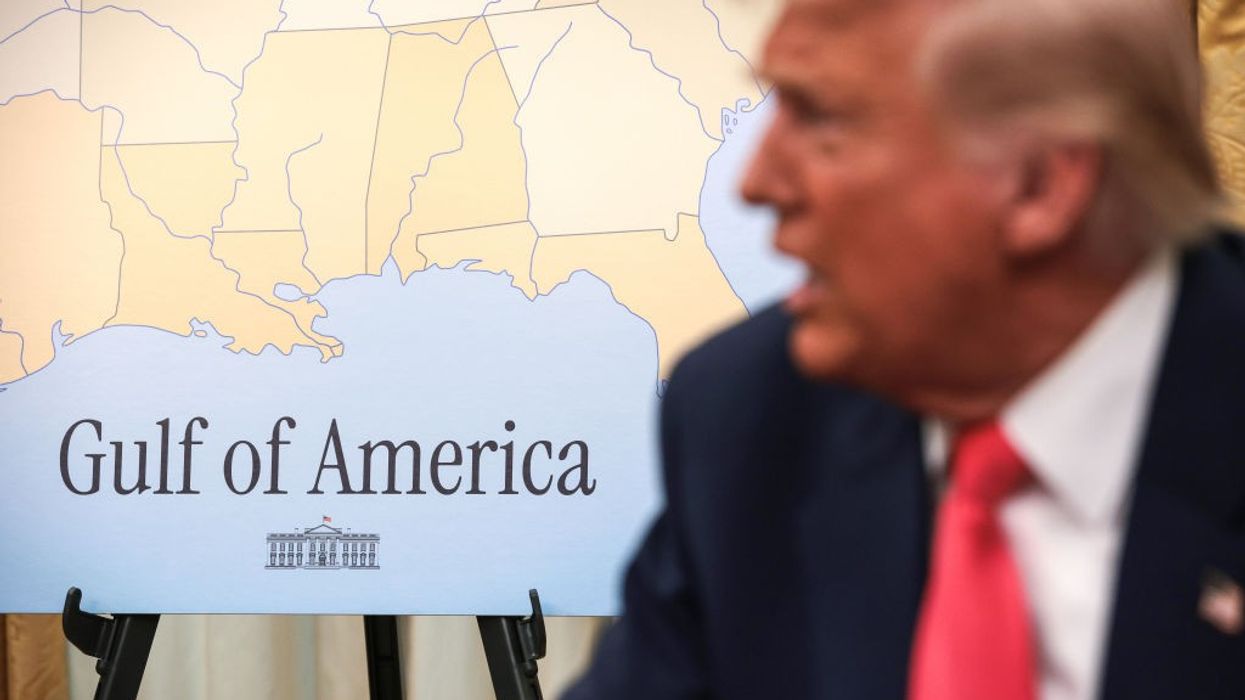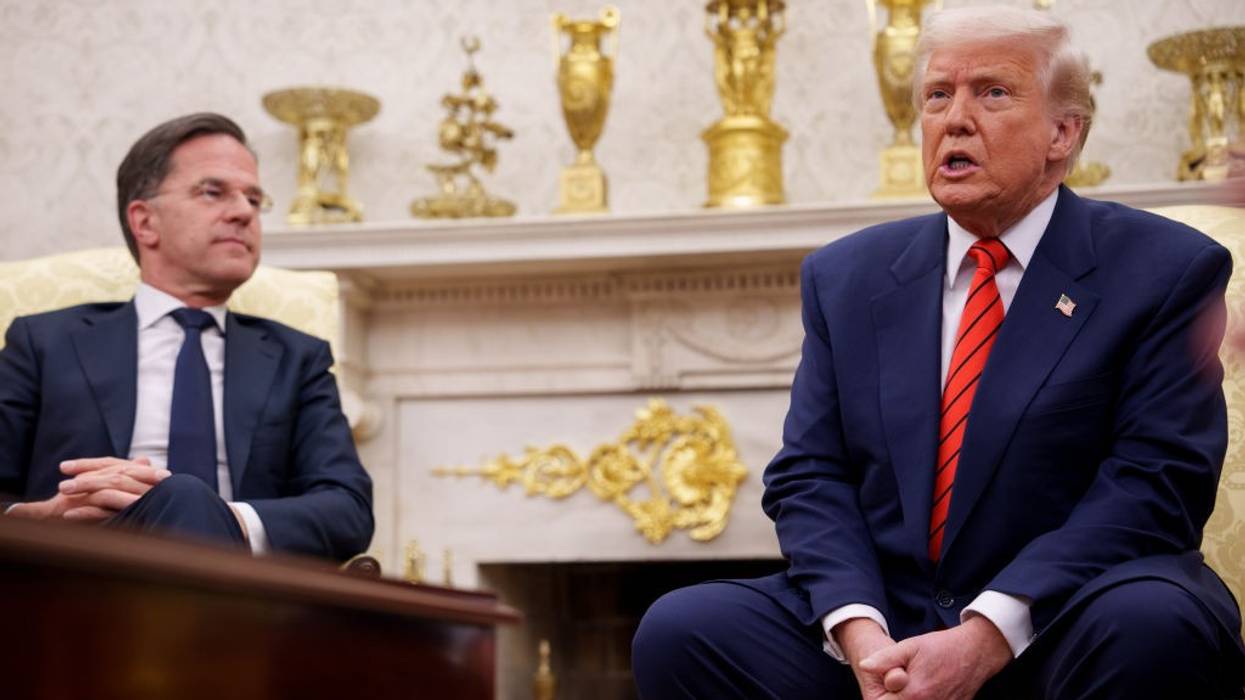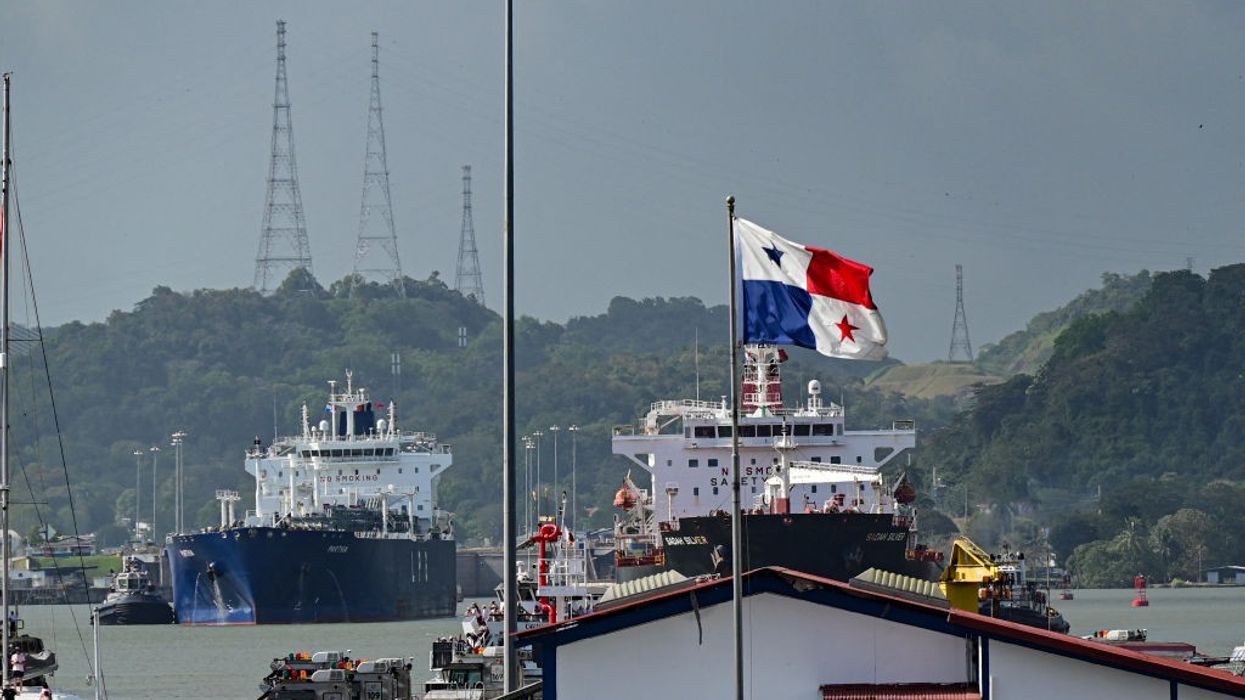Is Trump Taking Foreign Policy Advice From 1984?
Trump’s vision resembles Orwell’s ultimate horror: a world divided into three great continental blocs, with humanity held in thrall to omnipotent leaders like Big Brother through endless wars against an ever-changing enemy.
Most of us can remember at least a few troubling scenes from George Orwell’s dystopian novel 1984: the mandatory love demanded for the spectral dictator Big Brother; the malleability of facts at the Ministry of Truth; or the ruling party’s memorably grim slogans, “War is Peace, Freedom is Slavery.” But for me, the most disturbing image of all—and I first read the book in high school—was the “Two Minutes Hate,” aroused among the public by threatening images on giant video screens.
Within just 30 seconds, Orwell wrote, “A hideous ecstasy of fear and vindictiveness, a desire to kill, to torture, to smash faces in with a sledgehammer, seemed to flow through the whole group of people like an electric current, turning one even against one’s will into a grimacing, screaming lunatic.” As those moments of hate continued, what appeared was “the figure of a Eurasian soldier who seemed to be advancing, huge and terrible, his sub-machine gun roaring, and seeming to spring out of the surface of the screen, so that some of the people in the front row actually flinched out of their seats.”
Finally, as “row after row of solid-looking men with expressionless Asiatic faces… swam up to the screen” and brought those two minutes of Hate to their terrifying climax, the face of Big Brother appeared “full of power and mysterious calm,” prompting spectators to shout, “My Saviour!,” and to break into “a deep, slow, rhythmical chant of ‘B-B!… B-B!’—over and over.”
In its totality, Trump’s vision is of a continental Fortress America, formed by annexing the northern lands of Canada and Greenland, while sealing off Mexico for ethnic reasons as a separate but subordinate state.
For, as Orwell explained, those people of Oceania were “at war with Eurasia and in alliance with Eastasia.” Officially, “Oceania had always been at war with Eurasia,” which “represented absolute evil.” Yet through some quirk of memory, the novel’s hero Winston “well knew, it was only four years since Oceania had been at war with Eastasia and in alliance with Eurasia.”
That was, in some fashion, Orwell’s ultimate horror: a world divided into three great continental blocs, with humanity held in thrall to omnipotent leaders like Big Brother through endless wars against an ever-changing enemy. Even though he published1984 nearly 80 years ago in 1948, just two years before he died, more than three quarters of a century later, in the age of U.S. President Donald Trump, his fictional fantasy is fast becoming an unsettling simulacrum of our current geopolitical reality and that couldn’t be eerier (at least to me).
A Tricontinental Strategy
Amid a torrent of confusing, often contradictory foreign policy pronouncements pouring forth almost daily from the Trump White House, the overall design of his de facto geopolitical strategy has taken shape with surprising speed. Instead of maintaining mutual-security alliances like NATO, President Trump seems to prefer a globe divided into three major regional blocs, each headed by an empowered leader like himself—with Russia dominating its European periphery, China paramount in Asia, and the United States controlling, in a version of fortress America, all of North America (including, of course, the Panama Canal). Reflecting what his defense secretary called a “loathing of European freeloading” and his administration’s visceral disdain for the European Union, Trump is pursuing that tricontinental strategy at the expense of the traditional trans-Atlantic alliance, embodied by NATO, that has been the foundation for American foreign policy since the start of the Cold War.
Trump’s desire for ultimate continental hegemony lends a certain geopolitical logic to his otherwise seemingly off-the-wall, quixotic overtures to claim Greenland as part of the United States, reclaim the Panama Canal, and make Canada “the 51st state.” On his sixth day in office, President Trump told reporters aboard Air Force One, “I think Greenland will be worked out with us. I think we’re going to have it.” He then added, “I don’t know really what claim Denmark has to it. But it would be a very unfriendly act if they didn’t allow that to happen because it’s for protection of the free world.” After Vice President JD Vance made a flying visit to a remote U.S. military base in Greenland and claimed its people “ultimately will partner with the United States,” Trump insisted that he would never take military force “off the table” when it came to claiming the largest island on this planet.
Turning to his northern neighbor, Trump has repeatedly insisted that U.S. statehood would mean “the people of Canada would pay a much lower tax…They would have no military problems.” During his first weeks in office, he imposed a 25% duty on all imports from Canada and Mexico, which was quickly followed by a blizzard of similar tariffs that instantly sparked multiple trade wars with once-close allies. In response, Justin Trudeau, then Canada’s prime minister, whom Trump was already referring to as “governor” (as in the head of that 51st state), charged in an emotional speech that the American president wants “to see a total collapse of the Canadian economy, because that’ll make it easier to annex us.”
In his inaugural address last January, President Trump also complained that “the Panama Canal… has foolishly been given to the country of Panama after the United States… spent more money than ever spent on a project before and lost 38,000 lives in the building of the Panama Canal.” He added that “we have been treated very badly from this foolish gift that should have never been made, and Panama’s promise to us has been broken… And above all, China is operating the Panama Canal. And we didn’t give it to China.” To a burst of applause, he insisted, “We gave it to Panama, and we’re taking it back.” No surprise then that, on his very first trip as secretary of state, Marco Rubio stormed into Panama City where he pressured its president, José Raúl Mulino, to placate Trump by withdrawing from Beijing’s global Belt and Road Initiative.
In its totality, Trump’s vision is of a continental Fortress America, formed by annexing the northern lands of Canada and Greenland, while sealing off Mexico for ethnic reasons as a separate but subordinate state. Then, sweeping aside what had long been a U.S. reliance on global multilateral defense pacts and, with the country’s Arctic approaches under its control, the administration would draw a defensive frontier around Greenland and through the North Atlantic Ocean, secure the Panama Canal as a southern bastion, and maintain military control over the entire Pacific Ocean. Every major component of such a strategy would, of course, be laden with the potential for conflict, particularly the administration’s plans for the Pacific, where the U.S. faces a continuing challenge from China.
Demolishing a World Order
Following his second inauguration in January 2025, President Trump has pursued this distinctive tricontinental strategy by working with remarkable speed to demolish the institutional pillars of the “rules-based international order” the U.S. had supported and tried to advance since the end of World War II. Standing in the Rose Garden on his April 2 “liberation day,” Trump proclaimed a roster of tariffs reaching as high as 49% that, said Foreign Policy magazine, “will shatter the world economy” the U.S. has built since 1945, while the respected Economist observed that it “heralds America’s total abandonment of the world trading order.” After calling the United States Agency for International Development (USAID) “corrupt” and falsely claiming that he had “stopped $50 million being sent to Gaza to buy condoms for Hamas,” Trump abolished just about all the global humanitarian initiatives of that agency. He cut 5,800 programs that provided food rations for a million Rohingya refugees in Bangladesh, malaria prevention for 53 million people globally, and polio immunization for millions of children worldwide, among all too many other things. In a further flurry of executive orders, he also shut down the global broadcaster Voice of America, spuriously claiming that it was “radical” (though a judge has, for now, stopped that shutdown process), withdrew from the World Health Organization (WHO), and quit the Paris climate accords for a second time. Apart from the harm inflicted on poor communities across three continents, the closure of most USAID programs has crippled the key instrument of America’s “soft power,” ceding China the role as prime development partner in at least 40 countries worldwide.
In junking that Paris climate agreement, Trump has ensured that the U.S. would abdicate any leadership role when it comes to the most consequential issue facing the international community, climate change and the potential devastation of the planet. In the process, he has left a void that China may readily fill by offering stable world climate leadership in contrast to the “aggressive unilateralism” of Trump’s “drill, baby, drill” second term.
With its military alliances compromised and its trade relations roiled by tariff wars, Washington’s international influence will, in all probability, be significantly reduced (or worse) by the end of Trump’s second term in 2029.
Reflecting his aversion to multilateral alliances, Trump’s first major foreign policy initiative was a unilateral attempt to negotiate an end to the Russia-Ukraine war. On February 12, he launched peace talks through what he called a “lengthy and highly productive” phone call with Russian President Vladimir Putin, agreeing that “our respective teams start negotiations immediately.” By month’s end, tensions from that tilt toward Moscow had culminated in a televised Oval Office meeting in which Trump berated Ukrainian President Volodymyr Zelenskyy, saying, “You’re either going to make a deal or we’re out, and if we’re out, you’ll fight it out. I don’t think it’s going to be pretty.”
That unilateral approach not only weakened Ukraine’s ability to defend itself, but also disregarded and even degraded NATO, which had, for the past three years, expanded its membership and military capacity by supporting Ukraine’s resistance to Russia’s invasion. Recoiling from the “initial shock” of that utterly unprecedented breach, Europeans quickly appropriated $160 billion to begin reinforcing their own arms industry in collaboration with both Canada (not eager to become the 51st state) and Ukraine, thereby aiming in the future to reduce their dependence on American weaponry. If his administration does not formally withdraw from NATO, Trump’s ongoing hostility, particularly toward its crucial mutual-defense clause, may yet serve to weaken if not eviscerate the alliance—even as, recently, Trump has also gotten “very angry” and “pissed off” at Russian President Vladimir Putin for not responding effusively enough to his gestures. Consider that an indication that American relations across much of Eurasia could soon prove all too unpredictably chaotic.
Fighting for the Pacific Penumbra
In the Asia-Pacific region, Trump’s new global strategy is already straining longstanding U.S. alliances. At the start of his second term, the American presence there rested on three sets of mutual-defense pacts: the AUKUS entente with Australia and Britain, the Quadrilateral Security Dialogue (with Australia, India, and Japan), and a chain of bilateral defense agreements stretching along the Pacific littoral from Japan to the Philippines. However, Trump’s disdain for military alliances, his penchant for abusing allies, and his imposition of ever more punitive tariffs on the exports of all too many of those allies will undoubtedly only weaken such ties and so American power in the region.
Although his first administration famously waged a trade war with Beijing, Trump’s attitude toward the island of Taiwan has been ambiguous. “I think Taiwan should pay us for defense,” he said last June during the presidential campaign, adding, “You know, we’re no different than an insurance company.” Once in office, however, his defense secretary, Pete Hegseth, issued an interim strategic guidance stating that “denial of a Chinese fait accompli seizure of Taiwan… is the department’s sole pacing scenario,” requiring that the U.S. shift some of its forces from Europe to Asia. In similar signs of a commitment to that island, the administration has noisily raised tariffs and technology controls on China, while quietly releasing $870 million in military aid for Taiwan. Should Beijing indeed attack Taiwan outright or, as appears more probable in the future, impose a crippling economic blockade on the island, Trump could find himself faced with a difficult choice between a strategic retreat or a devastating war with China.
However it might happen, the loss of that island would break the U.S. position along the Pacific littoral, possibly pushing its naval forces back to a “second island chain” running from Japan to Guam, a major blow to America’s geopolitical position in the region. In short, even within Trump’s tricontinental strategy, the Western Pacific will remain at best a contested terrain between Beijing and Washington, fraught with the possibility of armed conflict in that continuing great-power rivalry, and war will remain a grim possibility.
A Residue of Ruin
With little chance of success, Trump’s attempt at a grand Fortress America strategy will likely leave a residue of ruin—corroding American global power, compromising the current world order, and harming countless millions worldwide who once benefitted from this country’s humanitarian aid. His attempt at consolidating control over North America has already encountered determined resistance in Ottawa, which responded to him with a strong bid to join Europe’s accelerated development of its own defense industries.
While the Trump administration’s aversion to formal alliances and its imposition of protective tariffs will likely weaken diplomatic ties to traditional allies in Asia and Europe, both China and Russia are likely to gain greater influence in their respective regions. From a strategic perspective, this start of a staged U.S. retreat from its military bastions at the antipodes of Eurasia in Western Europe and eastern Asia will weaken its longstanding influence over that vast landmass, which remains the epicenter of geopolitical power globally. With its military alliances compromised and its trade relations roiled by tariff wars, Washington’s international influence will, in all probability, be significantly reduced (or worse) by the end of Trump’s second term in 2029.
In the meantime, as he takes Americans on his own version of a succession of Two Minute Hates—of freeloading Europeans, prevaricating Panamanians, vile Venezuelans, Black South Africans, corrupt humanitarians, illegal immigrants, and lazy Federal workers—count on one thing: he’s leading us on a path eerily reminiscent of 1984. Unless, of course, like Orwell’s hero Winston, all too many of us somehow come to love Big Brother and so set aside our musty old Constitution and take Donald Trump’s often-repeated hints to elect him to a third term on a planet plunging headlong into a tempest of armed conflict, commercial chaos, and climate change.


